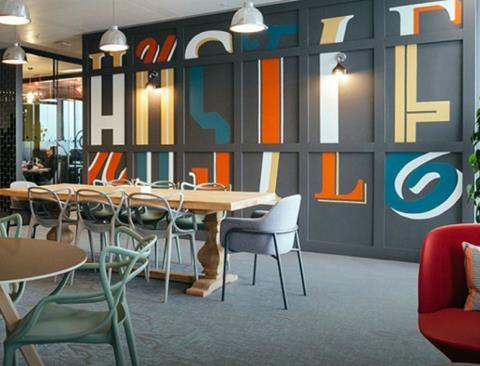London remains the global capital for co-working spaces, ahead of New York, according to new research from Cushman & Wakefield.

Central London saw 2.5m ft2 (225,000 m2) leased to flexible workspace providers in 2017, a 190% increase on last year, says the advisor's co-working 2018 report. Other cities that benefitted from the global trend include Amsterdam, now in second place after activity reached 296,000 ft2 (27,000 m2) or 7% of total leasing activity in the city in 2017.
'Flexible workspaces are now a vitally important part of the European economy, and an increasingly familiar presence in our cities,' said report author Elaine Rossall, a partner in Cushman & Wakefield’s EMEA Research & Insight team.
'The popularity of co-working has seen demand continue to grow exponentially across the continent. Amsterdam is a great example as it has one of the highest proportions of independent workers in the EU, with an entrepreneurial and creative culture that is nurtured by a flexible workplace.'
UK in the lead
Demand for flexible workspace across the world saw record growth in 2017, according to the research.
In London, the flexible workspace sector accounted for 21% of all office leasing activity in 2017. This compares to just 8.5% of leases in 2016. The UK now holds 32% of global share of flexible workspaces, which is more than the 27% in the United States and 22% in EMEA (excluding UK).
Central London saw a record 2.5m sq ft of lettings signed for flexible workspaces, more than 21% of all commercial office leases in the capital. The average rent paid by flexible workspace providers across the capital also rose to £65.50 per ft2 in 2017, a 10% increase on the previous year.
London has an estimated total flexible workplace stock of over 10 million ft2 (900,000 m2), which is more than double the estimated 4 million ft2 (370,000 m2) in second-placed Amsterdam. Both cities have seen a significant surge in transactions from the sector.
Elsewhere in Europe, burgeoning tech centres have led to strong uptake of flexible workplaces. Berlin is expected to be a beneficiary of Brexit as a home for start-ups and WeWork has huge expansion plans for up to 1,000,000 ft2 (90,000 m2) in the city. The success of Stockholm’s tech sector has led to declining vacancy rates, coupled with high rents, which will help the growth of the flexible office market.
'Co-working not only offers flexibility and room to grow, but can also improve the employee experience, revitalise corporate culture, and minimise companies’ exposure to long-term leases,' added Rossall. 'One of the additional key drivers of the market will be accounting changes that make shorter-term leases of flexible space more attractive to larger businesses.'
European progress
London and Amsterdam aren't the only European cities seeing real growth in the sector.
In Dublin, flexible workplace take-up increased from 0.7% of total take-up in 2016 to almost 7.9% in 2017. Similarly, Munich recorded 375,000 ft2 (35,000 m2) of take-up in 2017 compared to 77,000 ft2 (7,000 m2) in the whole of 2016. France is currently working on reforms to increase flexibility in the workplace. Station F, a new start-up superhub in Paris which opened in June, can house up to 1,000 start-ups.
Finally, in Spain, the flexible workplace market is also developing in both Barcelona and Madrid with business centres like WeWork, Regus and other collaborative spaces increasing their offer. In 2017 there has been more than 315,000 ft2 (29,000 m2) of take-up with the trends expected to grow across both cities, according to Cushman & Wakefield.
Growth outlook
Over the next year, the sector will see increasing demand for co-working space from larger businesses, as corporate occupiers embrace a more dynamic co-working culture or shorter and lower-risk leases. Uncertainty around Brexit may be driving demand for flexible workspace in London, as major corporates look to avoid long-term space commitments.
Growth will continue to accelerate across Europe, riding on the success of the tech sector, a flourishing start-up environment and projected office-based employment forecasts of growth of circa 6% in the next three years.
Cushman & Wakefield predicts that in the future, every large multi-let building will have a proportion allocated to flexible workspace as landowners look to take advantage of growing demand and meet the needs of potential occupiers.
'One of the key issues will be growing pressure on the supply of suitable co-working space and whether landowners and developers can keep up with demand. Nevertheless, we expect flexible workspaces will account for at least 10% of the total market across the UK within the next 10 years and for the rest of Europe to experience similar growth,' said Rossall.
'While offices have been the traditional source of space, pubs, hotels and libraries are increasingly of interest to flexible space providers, building on the popularity of coffee shops and cafes as flexible workspaces. Any brick-and-mortar business that is vacant for a period during the day could be utilised for flexible working, and the availability of vacant retail units could see co-working become a fixture of high streets across Europe,' Rossall concluded.










